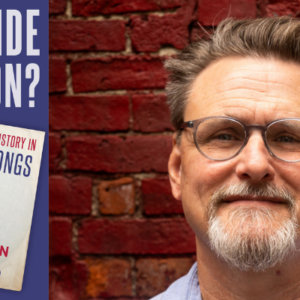
A Lost Voice, Writer's Block, and a New Life
Tova Mirvis Uncovers a Way to Speak the Truth
I was losing my voice. A few years ago, a bad cold left me coughing for days, but even when that passed, my voice remained raspy, my throat sore and in need of constant clearing. A lump-like feeling had taken up residence in the back of my mouth, like an obstacle around which my words needed to be pushed. I tried to speak—the words ready and waiting—but the sound was patchy, as though the radio station on which I was usually broadcast was too far out of range.
I began to ration my words. A phone call was a reckless luxury. To say hello to a friend was to risk a longer conversation I couldn’t afford. My throat felt scraped and painfully raw all the time. I explained to my kids I was listening even when I didn’t verbally respond. It became easier to simply not speak.
I went to doctors and was given a variety of diagnoses. It was allergies. It was a reaction to mold in the basement of the house to which we’d recently moved. It was stress. It was laryngeal reflux. Maybe, I worried, it was all in my mind. Tubes were inserted up my nose and down my throat to look for dangerous growths. I drank apple cider vinegar, supposedly an old Amish cure. I gargled with aloe water, drank honeyed tea by the gallon, sucked cough drops by the bagful. I worked with a nutritionist who told me that this was my body’s way of letting me know that something was wrong. She taught me how to avoid acidic foods and pay better attention to what I ate.
I didn’t know if any of these remedies would work, didn’t know what was actually wrong. It was hard to explain it to anyone—I’d entered a realm of sickness that seemed to have no discernible cause or name. After months of following a strict diet (no coffee, no chocolate), the raw feeling in my throat finally began to ease. But my voice still felt stilted, my words patchy. The feeling that something was blocking my speech remained. I felt closed off from those around me, encased inside my own quiet world.
Finally, when I began to worry that my voice would never return to the way it had been, my doctor referred me to a voice clinic. There, the walls were plastered with signed pictures of the famous singers (Adele and Lionel Ritchie, Steven Tyler and Roger Daltry) who had been patients here, their voices worn down from excessive use. From the therapy rooms beyond the waiting area, I heard operatic voices, singing scales.
“Are you a singer?” the women at the reception desk asked.
“No, a writer. I sit quietly all day.”
Whatever voice condition I suffered from, it was hardly caused by overuse.
At the same time as I was experiencing this loss of my voice, I sat alone every day, struggling to write a memoir. I was too far in to turn back (I had sold it based on a proposal) but could barely get the words out. This book—about leaving a marriage and the Orthodox Jewish world in which I was raised—scared me more than the three novels I’d already published. In fiction, I could play an elusive game of now you see me, now you don’t. In memoir, I felt vulnerable at every turn— with every word, I felt in danger of being exposed. If writing a novel felt like I was using my words to build a world, here I was using words to strip away the enclosing structures around me.
When my name was called, I was ushered into an exam room where a camera and TV screen were set up. A microphone was clipped to my sweater and a wire-strewn headset was placed on my head, as though we were trying to contact the mother ship.
“According to legend there is a pot of gold at the end of the rainbow,” I read from a laminated page I was handed.
“Ah, Ah, Ah, Ah, AH.” In the next room, an opera singer practiced her scales, her voice soaring as she hit every note.
“Mama makes muffins in the morning,” I read.
More tests, and eventually the voice therapist presented me with a print-out of data. “Your vocal cords are constricted,” he diagnosed.
I didn’t understand what the data demonstrated but, at least on the page, I did know what it meant to have a voice that felt constricted.
I had always been a tentative writer—behind each word, I heard the whisper: could I really say this? Could I really think this? Having grown up in a tight-knit, rule-laden Orthodox Jewish community, I had an ever-present awareness that there were things that couldn’t be said. The words allowed and forbidden, appropriate and inappropriate, nice and not nice battled inside me. To say that people didn’t always believe as they should—that inside some of us there existed a darker inner terrain—seemed like the gravest transgression of all.
My first two novels, both about the Orthodox world, received their share of condemnation for being critical of that world, my own world. I was negative, it was said. I was airing dirty laundry. And yet to write, I knew, was to banish any voice of propriety and authority and communal judgment. Cynthia Ozick wrote that to be a novelist was “to seize unrestraint and freedom, even demonic freedom, imagination with its reins cut loose”—words I wanted to hang on the walls inside my mind. My reins, I knew, were wrapped far too tightly. I longed for fluidity, words to slide from me, unimpeded. I wanted sentences that wouldn’t have to pass through some censoring contraption like those rolling ball sculptures—down a ramp, through a shoot, around a curve, and then, only then, allowed to emerge.
After years of wrestling, I left the Orthodox world in part because I could no longer abide the feeling of being so constricted.
Once a week, I went to the voice clinic where, with my voice therapist, I practiced talking constricted and talking free. He wasn’t sure what had caused this malady but the task now was to help me loosen my vocal cords which were pulling together tightly, narrowing the passageway of the upper airway. A healthy voice, he told me, had freedom. It had fluency, power, range and flexibility. There were ways to free the voice—posture affected the voice, how I breathed, how I held my body. There were ways to open what was closed.
With my finger resting lightly on my neck and feeling somewhat ridiculous, I made humming sounds and concentrated on how my throat felt as I formed words. The singers in the rooms next to me continued to practice their scales—boldly, loudly—as I noticed how I held my body as I spoke. My hand went to my throat every time I felt the tightening sensation.
When I wrote too, I thought constantly about my voice: Did my voice on the page still sound constricted or was it coming free? Before I left Orthodoxy, I never imagined I could write a memoir. For years, I had been besieged with religious doubts, but to write about this explicitly would be to name what I wasn’t ready to face. I had felt like I needed to quiet what I thought, in order to remain inside the life I had constructed for myself. Yet once I left, the story became the only one I could envision telling. A ticker tape scrolled across my mind: I left my marriage, I left Orthodox Judaism. I couldn’t create other stories until I could tell this one—it felt more like an urge to speak than to write.
But even so, I worried about the response—from those I loved, of course, but also from those inside the religious world to which I no longer belonged. I might have left, but I still carried those critical voices in my head. It was that old question: were you allowed to say what you really thought?
“Are you noticing any improvement?” my voice therapist asked at the end of one of our sessions where I had practiced speaking, where I had massaged my larynx, where I had listened longingly to those opera singers.
“It’s not just when I speak that I feel the constriction, it’s also when I write,” I said, cautious and sheepish to be making this connection—already this malady seemed more like the kind of affliction a novelist would (probably heavy-handedly) assign to a character to convey something of symbolic importance.
This was starting to feel more like regular therapy than voice therapy, but he nodded, unsurprised. I talked and talked: about the feeling I used to have sometimes before I left Orthodoxy, of a bodily sense of constriction, my own life closing around me too tightly. I told him how, in the months before I made the decision to leave, I became aware that I stood with my arms crossed tightly in front of me, my nails digging into the skin of my arms as though I needed to hold myself intact. I told him of the recurring dream I used to have, that I was speaking but inexplicably there was no sound; I told him that when I wrote, I was afraid of saying too much, of revealing too much of myself.
We were no longer in the realm of tests and scores and numbers, but inside the murkier regions of what a voice was. The voice was created by the physical process of air vibrating across the larynx, but a voice was also a vehicle of delivery, conveying what was inside us to the rest of the world.
“Your voice,” he said before I left, “is your identity.”
As much as I was compelled by the metaphorical nature of this, I didn’t know if I really believed that my constricted voice was an outgrowth of my constricted self. But I did know that what he said about voice was true, on the page as well. The voice of my book was where I would live most plainly. If I was going to write this memoir, I needed to find a way to free my voice.
I sat with the book every day, slowly becoming less afraid. As I wrote, I practiced my own form of vocal exercises. Writing felt like a physical process of loosening and opening, as though I needed to craft a wider space inside myself—an ever-expanding box—from which to write. Just one sentence. I told myself. And then one more. Sometimes I imagined those opera singers, fearlessly belting out their notes, and tried to envision myself letting the words fly, louder, clearer, stronger.
Slowly, one sentence set free another sentence. What once felt impossible seemed so simple. On these pages I was allowed to say. To say, I knew, was to make yourself vulnerable. It was to risk censure. It was to expose who you really were. And yet after so many years of feeling so clenched, it came as an immense relief: I could say what I felt, give voice to what I believed. In writing the memoir, I came to understand that you never leave a world that has shaped you only once. You leave and you leave. And to write this story was to leave once again.
My voice is mostly better now, though sometimes I hear the small gaps in fluidity, or clear my throat a little too often or feel, at the base of my throat, that tightening sensation. I’m still not sure what exactly was wrong—there are lots of ways to understand both the malady and the cure. I still try to follow a strict diet, having learned to pay attention to how food affects my voice. I massage my larynx, trying to widen the muscular space around my voice box. Every day when I sit down at my computer, my hands go first to my throat, as though I can loosen all the clenched parts that remain. Before I write, I feel a need to test my voice and speak out loud. Write honest, write true, I say and then begin.
__________________________________
Tova Mirvis’s The Book of Separation is available now from HMH.
Tova Mirvis
Tova Mirvis is the author of the memoir The Book of Separation which was a New York Times Book Review Editor’s Choice and excerpted in the New York Times Modern Love Column. She is also the author of three novels, Visible City, The Outside World and The Ladies Auxiliary which was a national bestseller. Her essays have appeared in many publications including The Washington Post, The Boston Globe Magazine, Real Simple, and Psychology Today, and her fiction has been broadcast on NPR. She lives in Newton, MA with her family.



















